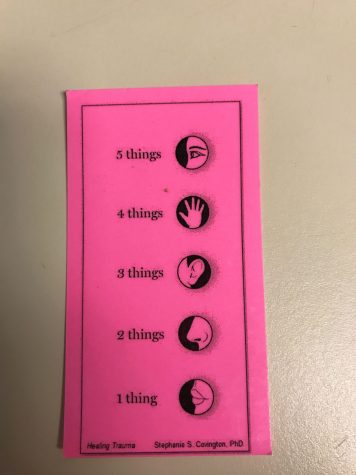Test anxiety
Testing anxiety has become prevalent in schools, affecting many student’s test scores and grades. Despite its pervasiveness, this issue is still quite misunderstood.
The Anxiety and Depression Association of America defines testing anxiety as a form of performance anxiety that affects a student’s academic scores, regardless of their level of preparation.
The world is about to collapse. You cannot breath. Anxiety is rushing through your body. This is what Allie Hambright ’18 feels when she takes a test.
Hambright noticed she began to have these symptoms during tests in her sophomore year. This is when she concluded that she suffered from testing anxiety.
The Anxiety and Depression Association of America defines testing anxiety as a form of performance anxiety that affects a student’s academic performance no matter how prepared they may be. Test anxiety can be caused by high stress, a fear of failure, lack of preparation or a history of low test performance. Anxiety is a mental health problem closely related to depression and ADHD that can leave students feeling physical, emotional and behavioral effects.
Physical effects may be lightheadedness, being feverish, rapid heartbeat or being sick to their stomach. Emotional side effects may be frustration, helplessness, anger or disappointment. Behavioral effects may include difficulty concentrating, comparing class or test performance to friends and peers or having negative thoughts.
Taylor Grider ’18, who had been diagnosed with ADHD inattentive type at age six explains that, although undiagnosed with anxiety, she can get easily distracted during tests which affects her overall performance.
“During the test having people get up and be done […] freaks me out [that] I’m not going fast enough or that I obviously don’t understand it because I’m not going as fast as everyone else.”
With the pressure of receiving good grades on every student’s mind, testing anxiety can create even more stress on a student because of their history of lower test scores than their peers.
“Many students struggle with being defined by their grades and their test scores. Because a student’s GPA and test scores are a large portion of college admissions, even more pressure is put on students to do well,” said Kelly Bergmann, ELP and guidance counselor at West. “Obviously this creates more anxiety. These numbers do not tell the full story of the student’s academic and personal strengths.”
The effects of testing anxiety range from low grades or a feeling of helplessness to a complete panic attack, where a very sudden onset of fear or panic leaves the student unable to think straight or even complete a test or other assignments.
Test anxiety does not just affect a student’s performance on tests. It can hurt a student’s drive to complete homework assignments and may even start to affect their personal life.
“The anxiety part was finding its way into other parts of my life because I was letting it build up, so I was just more anxious at home and I spent more time by myself in my room,” said Hambright.
While most students try to suffer through their testing anxiety without receiving help, students that try too hard to push past the symptoms during the test may need to step away from the test, leave the class and take a break.
According to Bergmann, students may leave the class without repercussions if reasonable.
“Students should report to either the Health Office or the Guidance Office if they cannot be in class due to a mental health concern. From there, we will help support the student to determine how best to move forward. We will also work with that student’s teacher to make a plan for missed work.”
One way for students to get help for their test anxiety is to get a 504, a document that tells teachers what accommodations need to be made for the student depending on their situation.
“My 504 basically states that I get extra time on tests, teachers are required to work with me at my request and if they don’t then I don’t have to take that test until they work with me,” said Grider.
It can be hard for students with testing anxiety to know when to step away from something that may trigger their symptoms. Many students that are affected can feel like they are the only ones suffering. This can make students feel discouraged from sharing their condition with friends or teachers for a number of reasons.
“There’s always that person that doesn’t even have to study or read. They just know it and I’m definitely not like that. It’s just hard,” said Grider.
Hambright agrees. “I would just be like ‘why can I not get this? Why is this not working out for me?’”
Although a student knows what to expect on a test and may spend hours studying or completing review assignments, it is still nearly impossible for someone with testing anxiety to prepare for what they may feel like during the test.
“The hard thing about it is that you know that you are going to have anxiety about taking this class or doing this homework so you don’t even want to do it,” said Hambright.
Testing anxiety has reached a level of normalcy in schools due to the pressure and stress students go through on a daily basis, yet students that struggle with testing anxiety still feel like they are the only ones struggling or that there is no one for them to turn to that really understands their situation.
“I just feel like it needs to be discussed more in school and how this is affecting your future,” said Grider.
“I feel like a psychology class on mental health and being aware of things like that would really help a teacher because I feel like you don’t really know what it’s like unless you’ve experienced it yourself,” said Hambright.
Teachers are, however, supposed to be able to handle situations involving testing anxiety or another mental health disease that may hurt a student’s performance in class.

“Each high school has school counselors who have significant training in mental health. High schools also have Student and Family Advocates, who also have mental health and social work backgrounds. All teachers have training and experience in helping students with all mental health needs, including anxiety,” said Bergmann.

A card that Hambright carries in her wallet that helps remind her how to calm down when she is anxious.
The most important thing to make sure testing anxiety is treated, whether with or without medication, is to find ways to help cope or to help ground oneself during an anxiety attack.
Among tapping her fingers together or writing down all of the information she may need for a test before beginning the exam, Hambright just reminds herself that one test will not define her.
“This test is not going to determine my entire future. If I get a bad grade on this one test, or maybe a bunch of tests, if I get a bad grade in this one class it’s not going to affect the rest of my life in such a bad way that I [can’t] fix it,” she said.
If you think you have test anxiety, severe anxiety or panic disorder, reach out to a guidance counselor or another trusted adult to find a plan that will help.
Your donation will support the student journalists of West High School. Your contribution will allow us to purchase Scholarship Yearbooks, newsroom equipment and cover our annual website hosting costs.

Sophie Stephens is a senior at West; this is her second year on staff and her second year as an editor. She is the managing editor for the website and...

Pareen Mhatre is a senior and she is the Photo Editor and Online Managing Editor. This is her second year on staff. In her free time,...



